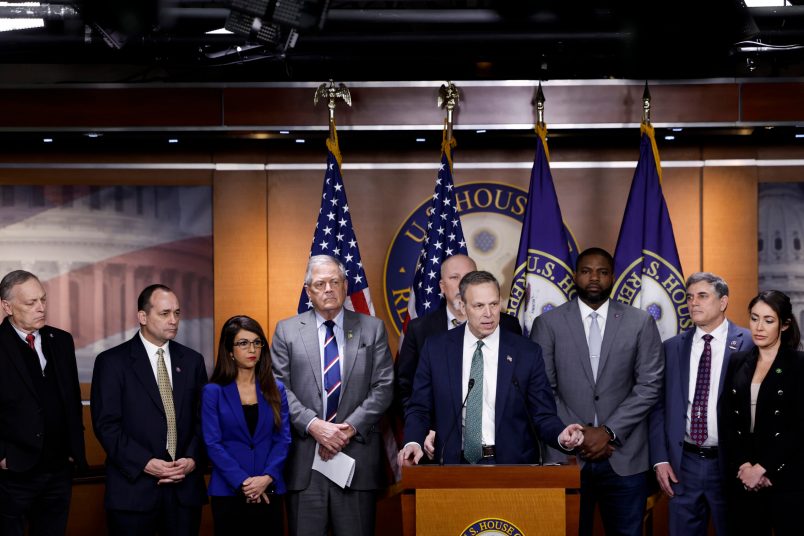Congress needs to pass a budget. It also needs to lift the debt ceiling. For months, the particulars of the coming clashes were fuzzy.
Those two must-pass items are on distinct, but parallel tracks, particularly as Republicans threaten to withhold their votes to lift the debt ceiling unless President Joe Biden forks over political concessions. The White House has insisted that the issues be handled separately, while Republicans struggle to coalesce their caucus behind the basic parameters of what those demands would be.
Now, at least one group of far-right lawmakers has decided to get some cuts on the record.
Reacting to Biden’s newly-released budget plan and continued staunch criticism from Democrats, the House Freedom Caucus released a one-page list of cuts on Friday, largely to spending Congress already allotted in 2022 for 2023. To unveil it, the far-right group held a press conference that was scant on details of the plan but heavy on grievances.
“To ensure America does not default on our debts, the House Freedom Caucus is offering a responsible solution to the self imposed crisis,” House Freedom Caucus Chair Scott Perry (R-PA) said to reporters during the Friday press conference. “Simply put, the plan is to shrink Washington and grow America.”
It’s already won the approval of at least one upper-chamber peer.
“Finally, a return to commonsense in Washington,” Sen. Rick Scott (R-FL) tweeted Friday. “I fully support the House Freedom Caucus proposal.”
The budget is essentially a ransom note: the one-pager opens with the vague promise that members of the House Freedom Caucus will “consider” voting to raise the debt ceiling if they get the demands below.
“To the extent that this is posturing for their own base, it’s fine — but to the extent that it’s read as a real set of demands that the administration has to move towards, it’s really dangerous,” J.W. Mason, a senior fellow at the Roosevelt Institute, told TPM.
House Republicans have warned for months that they will hold the debt limit hostage and let the government default on its debt unless they get the budget cuts they want — not just concessions from Biden’s future budget, but changes to spending the last Congress already agreed on. It remained unclear Friday whether the Freedom Caucus announcement was the beginning of a Republican offer on what it would take to release the debt ceiling hostage, or a single GOP faction planting its flag.
The so-called plan is brief.
According to the sheet released on Twitter, the far-right members want to cap discretionary spending at 2022 levels for 10 years, nix Biden’s plan to forgive some student debt and rescind climate change-related funding, as well as the $80 billion approved for shoring up the Internal Revenue Service under the Inflation Reduction Act.
“This budget proposal is insane and would be extremely destructive if anything like it was adopted,” Mason said.
One plank of the barebones budget calls for “restoring Clinton-era work requirements on welfare programs” — a frequent GOP rallying cry, despite the reality that many social programs already have work requirements built into them.
Of the various messaging salvos in the budget, Mason pointed to the work requirements as among the least evidence-based.
“It’s a disaster for all sorts of reasons, but really focusing on the work requirements — it’s funny because one of the clearest economic lessons we’ve learned is that work incentives don’t matter,” Mason said.
He pointed to the 2021 unemployment insurance payments during the pandemic, which some states let expire earlier than others.
“There was simply no faster growth in employment in states that ended benefits earlier,” he added. “And that’s about the cleanest test you could look for.”
Instead of making the case for their cuts, the Freedom Caucus members spent the majority of the 38-minute long press conference dumping on Biden’s plan and blaming him for the country’s debt.
Biden quickly pushed back on the conservatives’ half-baked proposal.
“Cut all spending other than defense by 25%… That means cops, firefighters. It means health care,’ he said from the White House. “We just have a very different value set.”
The seemingly hurried plan comes just a day after Democrats dared the House GOP to show its hand and actually put forth a proposal of its own.
On Thursday, shortly before Biden revealed his $6.8 trillion budget proposal — aimed at increasing spending on a wide range of new social programs and reducing the future budget deficit at the same time — House Minority Leader Hakeem Jeffries (D-NY) called on Republicans to release their own economic priorities.
“Show us your plan,” Jeffries said to reporters during his weekly press conference. “What are you hiding from the American people?”







Piss up a rope.
The hostage takers are ready to negotiate.
Crickets. Then came the swarms of locusts.

Not that it will change a lot of minds, but I’d love to see a series of ads targeted to each of these loons’ districts, telling them just what goods and services they’ll get to go without.